 Identifying as a Jew
Identifying as a Jew
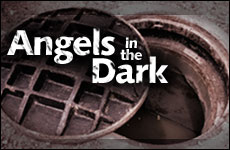

9 min read
The amazing story of survival in the sewers of Lvov.
It was the end of May, 1943 and Jewish Lvov was burning. Once home to Poland's third largest Jewish community, Lvov's 100,000 Jews numbered less than 8,000. "They are killing the Jewish police! This is the end!" came a cry from the ghetto.
Huge buildings, entire blocks were on fire. Jews ran in all directions. Hundreds made a dash for the sewers, hoping to avoid detection by vicious German dogs and their inhuman masters. Jewish children were rounded up and tossed into awaiting trucks like sacks of raw potatoes. Watching helplessly at the fate of their children, some women threw themselves down from several stories high. Little Krystyna Chiger beheld all of this in fear and terror.
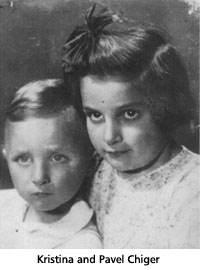 For months, a small group of Jews were preparing for this moment. Yaakov Berestycki understood the fate of Lvov's already martyred Jews would soon be his own. Daily, he and a few others clawed away at a concrete floor with spoons and forks and small tools from the apartment of a Jew named Weiss to gain entry into the sewers.
For months, a small group of Jews were preparing for this moment. Yaakov Berestycki understood the fate of Lvov's already martyred Jews would soon be his own. Daily, he and a few others clawed away at a concrete floor with spoons and forks and small tools from the apartment of a Jew named Weiss to gain entry into the sewers.
Ignacy Chiger was their leader. Weeks before the ghetto's destruction they broke through and lowered themselves into the sewers of Lvov. As they searched for a place that might be their 'home,' they were discovered by three Polish sewer workers.
The three Poles could have easily handed them over to the Nazis for a reward of badly needed food.
The three Poles could have easily handed them over to the Nazis for a reward of badly needed food. With no options before them, Weiss and Chiger explained what they had done. A cherubic-looking Pole named Leopold Socha was amused. He followed the diggers and raised himself up through the floor of the ghetto apartment. He beheld a defiant Jewish mother, Paulina Chiger, clutching two children closely to her chest. Deeply moved by the frightened youngsters, he broke out in a magnificent smile.
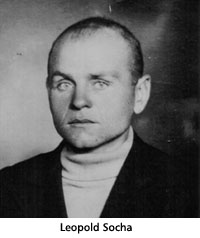 Leopold Socha was not merely any sewer worker; he was Chief Supervisor of all of Lvov's sewers. He knew the best places to hide and how to lead prowling German inspectors in a direction away from clandestine Jews.
Leopold Socha was not merely any sewer worker; he was Chief Supervisor of all of Lvov's sewers. He knew the best places to hide and how to lead prowling German inspectors in a direction away from clandestine Jews.
For Krystyna, her brother Pavel and the rest, the escape into the sewers was a nightmare. Accompanied by screams and shrieking in a stone and lime chamber that trapped all sound, the Jews entered a world of cold darkness. The deafening sound of the river waters terrified Krystyna. Her subterranean world was inhabited by rats that made no secret of their presence, and she could not see where she was going.
Lvov's labyrinth underground system was actually a complicated work of art, designed by early 20th century Italian engineers. As it wove its way beneath the city's major landmarks and streets, the 20-foot wide Peltew River roared, charging mightily. It snatched all those who got too close, including Krystyna's beloved Uncle Kuba.
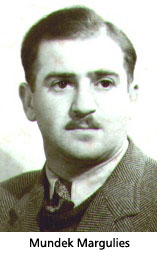 Another Jew who descended that terrible day in May 1943 was a resourceful, spirited Jew named Mundek Margolies. His name was on several deportation lists. Each time he somehow managed to escape. While in the ghetto he grew fond of Klara Keller. Mundek convinced her to take a chance with life by coming with him into the sewers, leaving her sister, Mania, behind.
Another Jew who descended that terrible day in May 1943 was a resourceful, spirited Jew named Mundek Margolies. His name was on several deportation lists. Each time he somehow managed to escape. While in the ghetto he grew fond of Klara Keller. Mundek convinced her to take a chance with life by coming with him into the sewers, leaving her sister, Mania, behind.
Socha promised Chiger that he would protect 20 Jews -- for a price.
Socha promised Chiger that he would protect 20 Jews -- for a price. The Chigers provided the lion's share of the money, having stashed some cash and valuables away before the war. Socha brought whatever food he could each day, as well as news from a place called Earth. He gave them pages of newspapers and took their clothes home to clean each week. On Passover he provided potatoes.
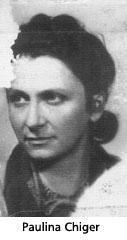 Over time the 20 hidden Jews shrank to ten. Some died. After living under inhuman conditions for several months, some left out of sheer madness. A newborn baby was smothered by its mother to save the lives of the others who trembled at the sound of his pitiful cries.
Over time the 20 hidden Jews shrank to ten. Some died. After living under inhuman conditions for several months, some left out of sheer madness. A newborn baby was smothered by its mother to save the lives of the others who trembled at the sound of his pitiful cries.
This small group of Jews struggled to maintain some semblance of Jewish life in their underground hiding place. Yaakov Berestycki, a chassid, found a relatively clean place to put on tefillin each morning.
Paulina Chiger asked Socha if he could bring her some candles. She wished to bring light of Shabbat into the sewers. Socha loved those who loved God as much as he did and he was excited by the challenge. Every Friday, Socha was paid by Ignacy and Paulina later lit her candles.
Socha spoke to the children. He played with them and tried to raise the spirits of all 'his' Jews. He took Krystyna to a place where she could see light drifting into the sewers as she sat upon his shoulders.
Mundek Margolies made daring forays into the destroyed ghetto to bring anything left behind that would make the lives of his friends more bearable. He had resolved to marry Klara after the war. They eventually learned that Klara's sister, Mania, was sent to Janowska concentration camp. Klara blamed herself for abandoning her.
In the hellish world of concentration camps Janowska was particularly horrific. People were left overnight to see how quickly they could freeze to death in icing vats of water. Each morning nooses were prepared in the large square. Jews were "invited" to "volunteer" to be hanged. Tragically, there was no shortage of daily volunteers. Despite all this, Mundek determined to sneak himself into Janowska to rescue Mania and other Jews he could convince to follow him into the sewers.
It was insane. It was impossible. But angels can fly.
It was insane. It was impossible. But angels can fly. Mundek changed identities with a Jewish slave he spied out from a work detail on one of his courageous flights outside the sewer. He smuggled himself into Janowska with the work detail at evening.
A little over a day later he located Mania behind a fence. Mania told him she simply could not live in a sewer and wrote a note to Klara, begging that she not blame herself. She blessed Klara with life.
Mundek met other Jews, urging them to leave. They thanked him and blessed him. But they were weak and terrified. The angel returned to the sewers, alone.
After several months the Chigers' money ran out. They met with Socha and he told them such an enormous risk required compensation; that Wrobleski and Kowalow, his two Polish friends, could not be expected to assist him otherwise. They wished each other goodbye and good luck.
The following day a familiar shuffling of footsteps was heard. It was Socha! He became so committed to preserving their lives he saw no alternative but to use his own money. But he was concerned that his buddies, upon learning that the money was his, would back out of the rescue. So he asked Chiger to pretend he had found extra money and that is was really Jewish money being paid to Wrobleski and Kowalow.
One day Socha revealed to the Jews his motive for rescue. He had been a convicted felon, spent considerable time in jail before the war. This mission was his way to show that he was a changed man and return to God.
Protective wings sheltered the hidden Jews. They survived discovery by a Pole who opened up a manhole cover and shouted: "It's true! There are Jews in the sewers!" (Socha moved them to a safer location.) They survived the planting of mines only days before the Germans fled Lvov, as the Russian army neared. Socha and Kowalow shouted with all the authority men in overalls could muster before well-dressed German soldiers. They warned that gas pipes lay directly below the ground they were digging for the mines. The Germans would blow up the whole street, themselves included.
It was a lie. And it saved the subterranean Jews.
They survived the melting snows and heavy spring rains in the winter of 1944. The water filled their small basin and rose above their necks. Krystyna screamed to Yaakov, the chassid, "Pray, Yaakov! Pray to God to save us!" Yaakov prayed and the water receded. Sixty years later she said, "It was a miracle."
After 14 months underground, Socha lifted the manhole cover, telling the Jews they were free.
The long awaited day of liberation came. In July 1944, after 14 months underground, Socha lifted the manhole cover, telling the Jews they were free! Like creatures from another planet, hunched over from a hideout with low ceilings, ten ragged, thin and filthy survivors found themselves surrounded by Poles who gaped in wonder: "Jews really did live in the sewers!" After months of darkness, their eyes were blinded by the sunshine. Everything seemed red, "bathed in the color of blood." Socha brought them indoors, to dark rooms where their eyes could adjust to light.
Months after liberation, Socha and his daughter were riding their bicycles in the street. A truck came careening in the direction of Socha's little girl. He steered quickly to knock her out of the way. Once again he saved a life -- his daughter's -- but Socha was killed, his blood dripping into the sewer. 'His' Jews, dispersed around Poland and Europe, returned to pay their last respects.
Krystyna still cannot cry. In the sewer she learned to suffer quietly. Her body swallows her tears. She dreads the sound of rushing water and moments of darkness. But she is a healer -- a medical professional with an office in New York and has raised a Jewish family. Her brother Pavel served in the IDF and also raised a new generation. Ignacy and Paulina lived out their lives in Israel where Paulina continued bringing the light of Shabbat into her home.
Yaakov moved to Paris where he, too, raised a Jewish family and lived a full life. All those in the sewer, but for Krystyna, have since passed to a world with angels on high.
 Mundek and Klara married shortly after the war. After moving to London from Poland, they established together a flourishing kosher catering business, still run by the family. He danced in the very center at every celebration he catered, grabbing his clients by the hand and beaming a broad smile, for his Jewish world was revived. Every Jewish simcha was his simcha. The world of darkness he once knew was now filled with light.
Mundek and Klara married shortly after the war. After moving to London from Poland, they established together a flourishing kosher catering business, still run by the family. He danced in the very center at every celebration he catered, grabbing his clients by the hand and beaming a broad smile, for his Jewish world was revived. Every Jewish simcha was his simcha. The world of darkness he once knew was now filled with light.
